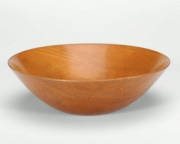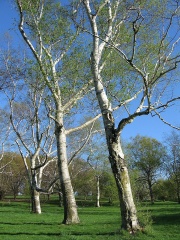Difference between revisions of "Birch"
(username removed) |
(username removed) |
||
| Line 2: | Line 2: | ||
== Description == | == Description == | ||
| − | A hardy, deciduous tree of the family ''Betulaceae'' that is common to North America, Europe and Asia. Birch tress are readily distinguished by their white bark and diamond-shaped leaves. The lightweight bark is full of natural waxes, oils and tannins that make it tough, durable, and waterproof. Thin sheets of bark were commonly used for paper in Central Asia and the Far East. The water-impervious bark was used for wigwams, canoes, and shoes for North American Indians. Birch produces a strong, pale yellow-brown wood with a close, straight grain and uniform texture that finishes to a smooth surface. It is sometimes dyed to imitate [http://cameo.mfa.org/materials/fullrecord.asp?name=mahogany mahogany]. Birch is used for tools handles, [http://cameo.mfa.org/materials/fullrecord.asp?name=plywood plywood], hoops, shoe heels, flooring, furniture, cabinetry, and firewood. Dyes can also be obtained from various parts of birch trees. The leaves, usually gathered before they develop a mature green color, produce a yellow dye. The bark produces a pale brown color. The female catkins (a long shoot bearing flowers with no leaves) are boiled to produce a dull yellow color. [http://cameo.mfa.org/materials/fullrecord.asp?name=birch | + | A hardy, deciduous tree of the family ''Betulaceae'' that is common to North America, Europe and Asia. Birch tress are readily distinguished by their white bark and diamond-shaped leaves. The lightweight bark is full of natural waxes, oils and tannins that make it tough, durable, and waterproof. Thin sheets of bark were commonly used for paper in Central Asia and the Far East. The water-impervious bark was used for wigwams, canoes, and shoes for North American Indians. Birch produces a strong, pale yellow-brown wood with a close, straight grain and uniform texture that finishes to a smooth surface. It is sometimes dyed to imitate [http://cameo.mfa.org/materials/fullrecord.asp?name=mahogany mahogany]. Birch is used for tools handles, [http://cameo.mfa.org/materials/fullrecord.asp?name=plywood plywood], hoops, shoe heels, flooring, furniture, cabinetry, and firewood. Dyes can also be obtained from various parts of birch trees. The leaves, usually gathered before they develop a mature green color, produce a yellow dye. The bark produces a pale brown color. The female catkins (a long shoot bearing flowers with no leaves) are boiled to produce a dull yellow color. [http://cameo.mfa.org/materials/fullrecord.asp?name=birch%20bark%20oil Birch bark oil] and birch beer are made from sap obtained from the trees. The sap allows birch bark to burn even when it is wet. |
| − | For micrographs of thin sections, also see [http://cameo.mfa.org/materials/fullrecord.asp?name=paper | + | For micrographs of thin sections, also see [http://cameo.mfa.org/materials/fullrecord.asp?name=paper%20birch paper birch], [http://cameo.mfa.org/materials/fullrecord.asp?name=yellow%20birch yellow birch], and [http://cameo.mfa.org/materials/fullrecord.asp?name=black%20birch black birch]. |
[[File:1980.398-SC58772.jpg|thumb|'''MFA Acc. #:''' 1980.398]] | [[File:1980.398-SC58772.jpg|thumb|'''MFA Acc. #:''' 1980.398]] | ||
== Synonyms and Related Terms == | == Synonyms and Related Terms == | ||
| − | betula; birk (Dan.); bouleau (Fr.); Birke (Deut.); beulla (It.); abedul (Esp.); berk (Ned.); betula (Port.); | + | betula; birk (Dan.); bouleau (Fr.); Birke (Deut.); beulla (It.); abedul (Esp.); berk (Ned.); betula (Port.); bjørk (Nor.); brzoza (Pol.); björk (Sven.); black birch (''Betula nigra''); paper birch (''Betula papyrifera''); cherry birch (''Betula lenta''); yellow birch (''Betula lutea''); white birch (''Betula pendula''); sweet birch (Betula lenta); river birch (''Betula nigra'') |
== Other Properties == | == Other Properties == | ||
| Line 33: | Line 33: | ||
== Additional Information == | == Additional Information == | ||
| − | Schoch, W., Heller, I., Schweingruber, F.H., Kienast, F., 2004:[http://www.woodanatomy.ch/ Wood anatomy of central European Species]: Common Birch, White Birch,[http://www.woodanatomy.ch/species.php?code=BEAL Betula alba (B. pendula / B. pubescens)] | + | ° Schoch, W., Heller, I., Schweingruber, F.H., Kienast, F., 2004:[http://www.woodanatomy.ch/ Wood anatomy of central European Species]: Common Birch, White Birch,[http://www.woodanatomy.ch/species.php?code=BEAL Betula alba (B. pendula / B. pubescens)] |
== Additional Images == | == Additional Images == | ||
| Line 44: | Line 44: | ||
== Authority == | == Authority == | ||
| − | * ''Encyclopedia Britannica'', http://www.britannica.com Comment: Retrieved May 25, 2003, from | + | * ''Encyclopedia Britannica'', http://www.britannica.com Comment: Retrieved May 25, 2003, from Encyclopædia Britannica Premium Service. |
| − | * | + | * F. H. Titmuss, ''Commercial Timbers of the World'', The Technical Press Ltd., London, 1965 Comment: 35-48 ppcf |
| − | * | + | * John S. Mills, Raymond White, ''The Organic Chemistry of Museum Objects'', Butterworth Heineman, London, 2nd ed., 1994 |
| − | * | + | * External source or communication Comment: Hardwood Manufacturers Institute, Memphis Tenn.: air-dry weight = 43 ppcf |
| − | * | + | * R. J. Gettens, G.L. Stout, ''Painting Materials, A Short Encyclopaedia'', Dover Publications, New York, 1966 |
| − | * | + | * G.S.Brady, ''Materials Handbook'', McGraw-Hill Book Co., New York, 1971 Comment: p. 598 |
| − | * | + | * Ralph Mayer, ''A Dictionary of Art Terms and Techniques'', Harper and Row Publishers, New York, 1969 (also 1945 printing) |
* ''Dictionary of Building Preservation'', Ward Bucher, ed., John Wiley & Sons, Inc., New York City, 1996 | * ''Dictionary of Building Preservation'', Ward Bucher, ed., John Wiley & Sons, Inc., New York City, 1996 | ||
| − | * | + | * Website address 1 Comment: Virginia Tech Dencrology website at www.fw.vt.edu/dendro/dendrology/main.htm (accessed Oct. 3, 2005) |
* Wikipedia, the free encyclopedia, at http://www.wikipedia.com Comment: http://en.wikipedia.org/wiki/Birch (Accessed Oct. 3, 2005) | * Wikipedia, the free encyclopedia, at http://www.wikipedia.com Comment: http://en.wikipedia.org/wiki/Birch (Accessed Oct. 3, 2005) | ||
| Line 66: | Line 66: | ||
* ''Caring for your Collections'', Arthur W Schulz (ed.), Harry N. Abrams, Inc. , New York, 1992 | * ''Caring for your Collections'', Arthur W Schulz (ed.), Harry N. Abrams, Inc. , New York, 1992 | ||
| − | * | + | * Pam Hatchfield, ''Pollutants in the Museum Environment'', Archetype Press, London, 2002 |
* ''Van Nostrand's Scientific Encyclopedia'', Douglas M. Considine (ed.), Van Nostrand Reinhold, New York, 1976 | * ''Van Nostrand's Scientific Encyclopedia'', Douglas M. Considine (ed.), Van Nostrand Reinhold, New York, 1976 | ||
| − | * | + | * Random House, ''Webster's Encyclopedic Unabridged Dictionary of the English Language'', Grammercy Book, New York, 1997 |
* ''The American Heritage Dictionary'' or ''Encarta'', via Microsoft Bookshelf 98, Microsoft Corp., 1998 | * ''The American Heritage Dictionary'' or ''Encarta'', via Microsoft Bookshelf 98, Microsoft Corp., 1998 | ||
Revision as of 07:24, 24 July 2013
Description
A hardy, deciduous tree of the family Betulaceae that is common to North America, Europe and Asia. Birch tress are readily distinguished by their white bark and diamond-shaped leaves. The lightweight bark is full of natural waxes, oils and tannins that make it tough, durable, and waterproof. Thin sheets of bark were commonly used for paper in Central Asia and the Far East. The water-impervious bark was used for wigwams, canoes, and shoes for North American Indians. Birch produces a strong, pale yellow-brown wood with a close, straight grain and uniform texture that finishes to a smooth surface. It is sometimes dyed to imitate mahogany. Birch is used for tools handles, plywood, hoops, shoe heels, flooring, furniture, cabinetry, and firewood. Dyes can also be obtained from various parts of birch trees. The leaves, usually gathered before they develop a mature green color, produce a yellow dye. The bark produces a pale brown color. The female catkins (a long shoot bearing flowers with no leaves) are boiled to produce a dull yellow color. Birch bark oil and birch beer are made from sap obtained from the trees. The sap allows birch bark to burn even when it is wet.
For micrographs of thin sections, also see paper birch, yellow birch, and black birch.
Synonyms and Related Terms
betula; birk (Dan.); bouleau (Fr.); Birke (Deut.); beulla (It.); abedul (Esp.); berk (Ned.); betula (Port.); bjørk (Nor.); brzoza (Pol.); björk (Sven.); black birch (Betula nigra); paper birch (Betula papyrifera); cherry birch (Betula lenta); yellow birch (Betula lutea); white birch (Betula pendula); sweet birch (Betula lenta); river birch (Betula nigra)
Other Properties
Tree height = 20-25m Bark = light gray to white, often peeling in papery strips
Wood is moderately acidic. Color: light yellow-brown to reddish brown. Rings: obscure. Pores: diffuse, fine. Grain: faint. Rays: obscure. On quarter sawed wood, rays appear as small brown flakes. Hard, heavy, poor weatherability.
| Density | 32-48 ppcf |
|---|---|
| Molecular Weight | specific gravity = 0.67 |
Additional Information
° Schoch, W., Heller, I., Schweingruber, F.H., Kienast, F., 2004:Wood anatomy of central European Species: Common Birch, White Birch,Betula alba (B. pendula / B. pubescens)
Additional Images
Authority
- Encyclopedia Britannica, http://www.britannica.com Comment: Retrieved May 25, 2003, from Encyclopædia Britannica Premium Service.
- F. H. Titmuss, Commercial Timbers of the World, The Technical Press Ltd., London, 1965 Comment: 35-48 ppcf
- John S. Mills, Raymond White, The Organic Chemistry of Museum Objects, Butterworth Heineman, London, 2nd ed., 1994
- External source or communication Comment: Hardwood Manufacturers Institute, Memphis Tenn.: air-dry weight = 43 ppcf
- R. J. Gettens, G.L. Stout, Painting Materials, A Short Encyclopaedia, Dover Publications, New York, 1966
- G.S.Brady, Materials Handbook, McGraw-Hill Book Co., New York, 1971 Comment: p. 598
- Ralph Mayer, A Dictionary of Art Terms and Techniques, Harper and Row Publishers, New York, 1969 (also 1945 printing)
- Dictionary of Building Preservation, Ward Bucher, ed., John Wiley & Sons, Inc., New York City, 1996
- Website address 1 Comment: Virginia Tech Dencrology website at www.fw.vt.edu/dendro/dendrology/main.htm (accessed Oct. 3, 2005)
- Wikipedia, the free encyclopedia, at http://www.wikipedia.com Comment: http://en.wikipedia.org/wiki/Birch (Accessed Oct. 3, 2005)
- Caring for your Collections, Arthur W Schulz (ed.), Harry N. Abrams, Inc. , New York, 1992
- Pam Hatchfield, Pollutants in the Museum Environment, Archetype Press, London, 2002
- Van Nostrand's Scientific Encyclopedia, Douglas M. Considine (ed.), Van Nostrand Reinhold, New York, 1976
- Random House, Webster's Encyclopedic Unabridged Dictionary of the English Language, Grammercy Book, New York, 1997
- The American Heritage Dictionary or Encarta, via Microsoft Bookshelf 98, Microsoft Corp., 1998
- CRC Handbook of Chemistry and Physics, Robert Weast (ed.), CRC Press, Boca Raton, Florida, v. 61, 1980 Comment: density=32-48 ppcf (0.51-0.77 g/cm3)



